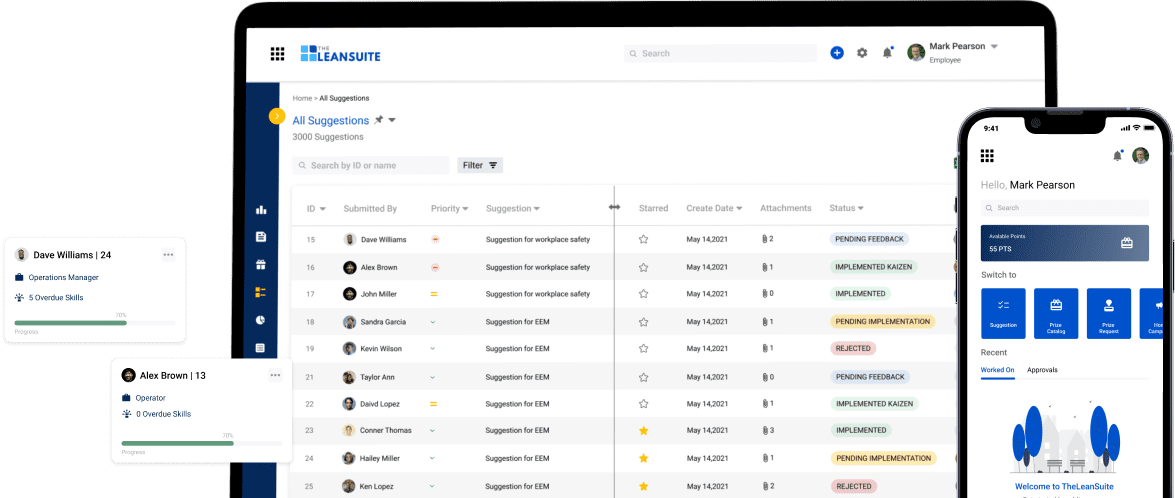With 24/7 operating hours, difficult working conditions, and physically demanding working conditions, employee engagement in manufacturing can be tough to manage.
What is Employee Engagement?
Employee engagement is often confused and used interchangeably with similar concepts such as employee happiness and employee satisfaction. However, there are some clear differences among these concepts.
Employee engagement does not mean employee happiness.
An employee might be happy at work, but that doesn’t automatically mean that they are working hard and are productive on behalf of the organization. Game rooms, free massages, and themed office parties are all fun and may be beneficial for other reasons. But, making employees happy is different from making them engaged.
Employee engagement does not mean employee satisfaction.
A lot of companies collect “employee satisfaction” surveys and senior management often talk about “employee satisfaction”. But, the bar is set too low. An employee who is satisfied might show up to work daily without any complaints. However, that same employee might not put in extra effort on their own. Moreover, they’ll probably leave their current job for another one that is offering them a 10% pay bump.
Employee engagement is instead referred to as the emotional commitment an employee has towards the work they do and their organization and its goals.
An engaged employee’s emotional commitment to an organization means that they actually care about their work and their company. In other words, they’re not working just for a pay-check or to receive a promotion, but they’re working on behalf of the organization’s goals.
Employees who are engaged care and use discretionary effort. For example, this means:
- — An engaged product developer works overtime when needed, without being asked.
- — An engaged retail sales associate picks up the trash on the shop floor, even if their manager isn’t watching.
- — An engaged line cook will finish plating the last few orders, even if their shift has ended.
Why is Employee Engagement in the Manufacturing Industry So Low?
According to an employee engagement report by Workday, employee engagement in the manufacturing industry is one of the lowest compared to other industries — at 34%. So, why does the manufacturing industry have such low engagement?
24/7 Operations
Many manufacturing plants and factories operate 24/7 as a lot of machinery needs to run continuously. As a result, companies need employees working day and night shifts to monitor their operations. But, 24/7 shift work can be very draining and exhausting.
Zero Shift Control
Because manufacturing plants and factories are big and require a lot of employees to run their operations, carefully organized work shifts are essential. But, this often means that employees have little to no control over their own schedules. Thus, making their job become monotonous and impacting their work-life balance.
Harsh Working Conditions
Many, if not all, manufacturing plants and factories have harsh working conditions — it can be hot, loud, and poorly lit. Therefore, making employees disengaged with their work as they are not working in a pleasant environment.
Physically Demanding Work
Manufacturing jobs are physically demanding as employees typically have to lift heavy things and tend to stand for long periods of time. Consequently, employees can become easily tired which can lead to disinterest and workplace burnout.
5 Ways to Keep Your Employees Engaged

1. Make employees feel valued and appreciated
Making your employees feel valued and appreciated, or in essence, feel recognized, is a great way to boost employee engagement in your manufacturing operations. It is beneficial to let your employees know how their work contributes to the company’s products, operations, and overall success. So, make sure you find the time to tell and show your employees how much their efforts, skills, and attitude are appreciated. But, it is important to note that this should come from fellow employees, supervisors, and senior management — not just from human resources. In sum, the most effective way to do make your employees feel valued and appreciated is to have an employee recognition program.
2. Collect ideas on how to improve efficiencies and the workplace environment
Your frontline employees know your production process best. Leverage this and encourage participation and collaboration by collecting ideas on how to eliminate shop floor inefficiencies and how to make the workplace environment better. Additionally, it is important that you provide immediate feedback on the process of any suggestions that they make. This ensures that they feel heard and aren’t putting in extra work for nothing.
3. Implement training and develop programs
Cross train your employees and rotate jobs to keep things fresh and strengthen your organization. Take the time to create a path of progress for each of your employees so that they have a personal plan for growth. Moreover, this gives them something to look forward to, work towards, and be excited about in their professional development. As a result, this will boost employee engagement within your manufacturing operations.
4. Provide as much flexibility as possible with scheduling
Whenever possible, allow your employees to have input in job scheduling and shift rotations. This ensures they feel like they are a part of the decision-making process. What’s more, if an employee can work the hours that they feel best fits their lifestyle, they are more likely to be engaged and to stay with your company.
5. Host social gatherings outside of the workplace
Another tip to boost employee engagement in manufacturing is to create opportunities outside the workplace for employees to gather and socialize. Doing this will build relationships across all levels of your organization and gives your team the chance to get to know each other on a personal level. In addition, this employee experience will connect them, further engage them, and allow them to improve teamwork.





